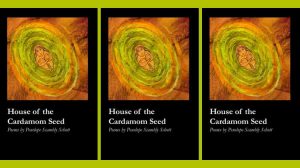Flowers of the Flesh by Effy Winter / Rhythm & Bones Press / 2019
 Effy Winter is a captivating writer based in Philadelphia, P.A. Winter’s work explores unfathomable heartache and unbridled eroticism through a beguiling occult lens. Daringly self-sacrificial and ever-forthright, her debut from Rhythm & Bones Press titled Flowers of the Flesh is a fervent poetical novel of confession, suffering, loss, and supreme consummation.
Effy Winter is a captivating writer based in Philadelphia, P.A. Winter’s work explores unfathomable heartache and unbridled eroticism through a beguiling occult lens. Daringly self-sacrificial and ever-forthright, her debut from Rhythm & Bones Press titled Flowers of the Flesh is a fervent poetical novel of confession, suffering, loss, and supreme consummation.
Flowers of the Flesh is a smoldering, anguished votive to the most primal human ecstasies and torments—a cathartic effigy of sheer intensity. The following poem unleashes alluring, catastrophic wildfire uncommon in contemporary poetry:
I writhe on a burial ground of putrid roses; gleaming crystals.
The fragments of our shattered hearts stain my skin,a soft horror.
I cannot contain this haunt—our raging romance.
Sickly blood seethes in my veins.You are a sultry disease I offer my breath to
over and over again.
As indicated early on through the opening Franz Kafka quote below, Winter’s romance is “sickly,” deathlike in its maniacally intimate grasp on the beloved. This passion is all-encompassing, transcendent, and immortal in purpose:
I dream of a grave, deep and narrow,
where we could clasp each other in our arms
as with clamps, and I would hide my face in you
and you would hide your face in me,
and nobody would see us anymore.Franz Kafka
Yet the intense waves of lust and grief that heave forth, frothing in the novel’s tidal passions, cannot be hidden from the outside world—the intimacies of this romance must be displayed, expressed, and reproduced on each page. Thus, a tension arises throughout the novel between the speaker’s urge to “contain this haunt” and “offer [her] breath to” the “disease” of the beloved.
There is clear tension throbbing behind, and propelling, Winter’s imagery of spreading, opening, and blooming:
I tragically unfold for you
the way a rose blooms its petals
for a tender violation.
The fragility, soreness, and wounding evoked throughout makes ample use of flower imagery to symbolize open vulnerability and the paradoxical violence and beauty of sex. For readers of Winter, the act of sex itself becomes a religious sacrament signaling both confession and forgiveness, as evidenced by the following poem:
There is this vile purging from the deep throat of a rose flower.
It is a selfish disease lingering within the wetness of florid air
saturated our shallow breath.We must bleed out within one another
to burn rancid flesh softly—our bony vessels of rotten petals
melting into an erotic ash.
The purgation of desire occurs between people simultaneously, through sexual ritualization that melts “bony vessels of rotten petals… into an erotic ash.” Sex purifies—eviscerates—and its scent lingers, endures in the sonic embers of Winter’s meticulously crafted lines. These poems invoke spiritual ecstasies through cyclical repetitions, echoes that brand themselves into the brain and the skin with the authoritative gravitas of scripture.
The weeping, worshipping, and begging that accompanies sex is wrapped up in the bloom and decay of all life, and the desire to experience such an apogee of vitality can only be expressed through the ritualistic conduit of the written word. Flowers of the Flesh becomes for readers a necessary liturgy of the human body in all its inexorable remuneration and reckoning, its bounty and blight.
Religious imagery of rebirth abounds:
I am reborn in the Holy Spirit’s rage—
a seraph possessing hellflame wings.
As does the Old Germanic, Old Norse, and Old English art of the concise figurative phrase replacing the common noun, known today as the ‘kenning’:
I am devoured in my breathbed—
The resulting style is decidedly Gothic, the lines themselves consisting of elaborate, open latticework that adeptly interweaves the rich alliterative tapestry of medieval poetry, the spiritual mysticism of hagiography, and the contemporary, post-confessional mode in the wake of “The Wanderer,” Plath, and Sexton alike. The book itself, an intricate spiral of birth and death, light and darkness, growth and atrophy, demands its rightful place on the shelf of the true lover of decadent romantic poetry.



